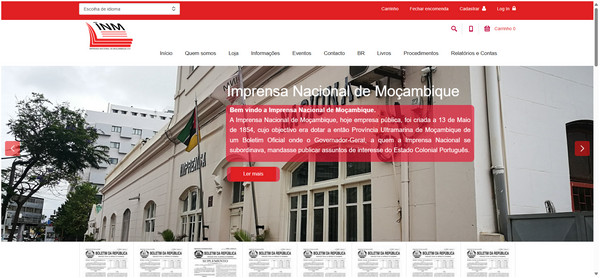Boletim da República (BR) in Mozambique

Boletim da República (BR): Mozambique's Official Gazette for Public Notices
The Boletim da República (BR), often simply referred to as the "Boletim," serves as the official gazette of the Republic of Mozambique. Established as the country's primary vehicle for legal and governmental publications, it functions as the authoritative source for disseminating laws, regulations, decrees, and other official announcements. Published by the Imprensa Nacional de Moçambique (National Printing Press) in Maputo, the BR has been in operation since Mozambique's independence in 1975 and is issued in series (e.g., I Série for general laws, II Série for administrative acts). As of September 2025, it remains fully operational, with editions available in print and increasingly digitized via government portals for broader accessibility.
Aim and Purpose
The core aim of the BR is to ensure transparency, legal certainty, and public accountability in governance. Under Mozambique's legal framework, including the Constitution (Article 55 on freedom of information) and the Administrative Procedure Code, all normative acts—such as new laws, presidential decrees, ministerial orders, and judicial decisions—must be published in the BR to acquire binding force. This publication serves several key functions:
Official Notification
: It acts as the legal mechanism for "public notice," making information accessible to citizens, businesses, and institutions. Once published, documents enter into force after a specified grace period (typically 30-90 days), allowing time for compliance.
Legal Validity
Publications in the BR confer erga omnes (universal) effect, meaning they are presumed known to all. Failure to publish invalidates acts, protecting against arbitrary governance.
Public Engagement
Draft laws and regulations are sometimes shared via the BR or linked channels for public comment, fostering stakeholder input. For instance, the government uses it to announce consultations on reforms, as seen in recent updates to the Foreign Exchange Law (Law No. 28/2022).
Archival and Accessibility
Editions are archived electronically on sites like the Ministry of Justice's portal (justica.gov.mz) or the official government portal (portaldogoverno.gov.mz), with free or low-cost access. This digital shift, accelerated post-2020, aligns with Mozambique's e-governance initiatives.
In essence, the BR upholds the rule of law by bridging the government and the public, preventing "secret laws" and enabling enforcement.
Relevance for Foreign Investors
For foreign investors eyeing Mozambique's dynamic economy—projected at 2.5% GDP growth in 2025, fueled by FDI in natural gas, agriculture, and renewables—the BR is not just a formality but a critical compliance tool and risk mitigator. Here's why it's particularly relevant:
Risk Management and Due Diligence
Strategic Opportunities: Publications often signal investment windows, like tenders for public-private partnerships or environmental impact approvals. For non-residents, it's a low-barrier entry to track Mozambique's FDI inflows (US$5 billion approved in H1 2025), helping align projects with government priorities. In practice, foreign investors should integrate BR monitoring into their strategy—via subscriptions, legal counsel, or APIEX alerts—to avoid surprises. While digital access eases this (e.g., searchable PDFs on inm.gov.mz), language barriers (Portuguese-only) underscore the value of local advisors. Overall, the BR enhances Mozambique's appeal as an investor-friendly destination by promoting predictability in a region ripe for growth. For the latest editions, visit the official Imprensa Nacional site.
Business Registration and Corporate Acts
:Under the Commercial Code (Decree-Law No. 1/2022), key corporate events—like company incorporation, amendments to articles of association, mergers, or dissolutions—require publication of a summary in the BR (typically in the II Série). This step validates the act against third parties, ensuring legal protection for investors. For example, registering a new Limited Liability Company (LDA) involves publishing statutes within days of provisional approval at the Commercial Registry, with costs around MZN 2,000 (~$30). Delays here (up to 90 days) can stall operations, so investors must budget for it in their 10-30 day setup timeline.
Risk Management and Due Diligence:Strategic Opportunities:
Publications often signal investment windows, like tenders for public-private partnerships or environmental impact approvals. For non-residents, it's a low-barrier entry to track Mozambique's FDI inflows (US$5 billion approved in H1 2025), helping align projects with government priorities.
In practice, foreign investors should integrate BR monitoring into their strategy—via subscriptions, legal counsel, or APIEX alerts—to avoid surprises. While digital access eases this (e.g., searchable PDFs on inm.gov.mz), language barriers (Portuguese-only) underscore the value of local advisors. Overall, the BR enhances Mozambique's appeal as an investor-friendly destination by promoting predictability in a region ripe for growth. For the latest editions, visit the official Imprensa Nacional site.
related reading
Official Legal and Regulatory Requirements for Business Registration
Business types and legal structures
Incorporation and Registration
Obtaining a Unique Tax Identification Number NUIT
APIEX Investment and Export Promotion Agency
Confederation of Economic Associations of Mozambique (CTA)
Commercial Registry Offices and E-BAU
Boletim da República (BR): Mozambique's Official Gazette for Public Notices
The Beneficial Ownership Declaration for Foreign Investors in Mozambique

